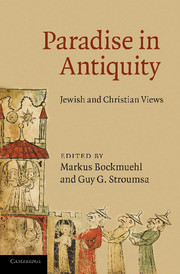Book contents
- Frontmatter
- Contents
- Notes on contributors
- 1 Introduction: the paradise chronotrope
- PART I PARADISES OF SECOND TEMPLE JUDAISM AND CHRISTIAN ORIGINS
- PART II CONTEMPORIZING PARADISE IN LATE ANTIQUITY
- 8 Tertullian's law of paradise (Adversus Judaeos 2): reflections on a shared motif in Jewish and Christian literature
- 9 The language of paradise: Hebrew or Syriac? Linguistic speculations and linguistic realities in late antiquity
- 10 The tree of life and the turning sword: Jewish biblical interpretation, symbols, and theological patterns and their Christian counterparts
- 11 Erotic Eden: a rabbinic nostalgia for paradise
- 12 Paradise for pagans? Augustine on Virgil, Cicero, and Plato
- 13 Heaven as a political theme in Augustine's City of God
- 14 Locating paradise
- 15 Epilogue: a heaven on earth
- Select bibliography
- Index of subjects
- Index of authors (cited in text)
- Index of sources
11 - Erotic Eden: a rabbinic nostalgia for paradise
Published online by Cambridge University Press: 06 December 2010
- Frontmatter
- Contents
- Notes on contributors
- 1 Introduction: the paradise chronotrope
- PART I PARADISES OF SECOND TEMPLE JUDAISM AND CHRISTIAN ORIGINS
- PART II CONTEMPORIZING PARADISE IN LATE ANTIQUITY
- 8 Tertullian's law of paradise (Adversus Judaeos 2): reflections on a shared motif in Jewish and Christian literature
- 9 The language of paradise: Hebrew or Syriac? Linguistic speculations and linguistic realities in late antiquity
- 10 The tree of life and the turning sword: Jewish biblical interpretation, symbols, and theological patterns and their Christian counterparts
- 11 Erotic Eden: a rabbinic nostalgia for paradise
- 12 Paradise for pagans? Augustine on Virgil, Cicero, and Plato
- 13 Heaven as a political theme in Augustine's City of God
- 14 Locating paradise
- 15 Epilogue: a heaven on earth
- Select bibliography
- Index of subjects
- Index of authors (cited in text)
- Index of sources
Summary
Unlike in the Hebrew Bible, for the Rabbis of late antiquity there were already two kinds of paradise, as E. E. Urbach has pointed out: the one that was lost to our first ancestors and the one that we may all gain, sometimes also known as “the world to come,” and sometimes even as the “days of the Messiah.” The borders between them were somewhat blurred but presumably there was a connection between them, although how the paradise that had been lost by Adam and Eve became the abode of the righteous in the future – and possibly also houses them at this very moment when we who are alive still trod this Vale of Tears – was not narrated straightforwardly by the Rabbis. The explanatory plot for this etiology thus needs to be found elsewhere and is indeed amply documented in various Jewish-Hellenistic sources. One instance is the famous words of Jesus on the cross to the “good thief” crucified together with him, inviting him after death to reconvene in the place which he calls by the name that the Septuagint had used for the Garden of Genesis, παρáδεισος, identifying paradise with the kingdom of heaven (Luke 23.43). Paul seems to have had a similar notion of paradise according to 2 Corinthians 12.4 as many scholars including G. Scholem have noticed.
- Type
- Chapter
- Information
- Paradise in AntiquityJewish and Christian Views, pp. 156 - 165Publisher: Cambridge University PressPrint publication year: 2010



